Every loss we face in life comes with its unique grieving process, and the death of a best friend can trigger intense feelings of sadness, anger, fear, confusion, and more.
Unlike the death of spouses or core other family members, sometimes people unintentionally overlook the significance of a friend’s death. However, this experience can feel just as shocking or gutting as any other loss.
If you’re struggling after a friend died, here are some compassionate reminders that may support you during this time.
Remember Your Complicated Feelings are Common
When a close friend dies, you may notice yourself experiencing mixed emotions about the loss. For example, you might feel guilty that you didn’t spend more time with your friend. You might feel angry that your loved one’s life was cut short. You might feel afraid about your own morality.
These emotions are typical, and they aren’t bad or wrong. They also don’t need to be fixed or even changed. Most people find that emotions ebb and flow- some days, they will feel quite strong and even consuming. On other days, you might find yourself experiencing some joy or even relief– both of which can be confusing.
Some people struggle the most in the early days. But others feel a sense of numbness for the first few or weeks or months only for the heavy emotions to settle in with time.
Remember there is no timeline for grief. Reconciling your emotions is a human process that all bereaved people experience. This ‘moving through’ doesn’t exist on a linear path.
Spending Time with Mutual Friends May Help
Bereavement support offers a sense of validation and connection as you move through your feelings of grief. Although no two people grieve in the same way, there’s something profound about sharing stories and love with people who knew your close friend.
You may also find it helpful to connect with your friend’s family. Remember that a close family member may not have much space for your emotions right now. However, there’s a good chance they will still appreciate you showing your support or offering your assistance. You can do this in simple ways, including sending flowers, dropping off food, or helping with basic tasks around the house.
In general, when someone dies, people benefit from knowing comfort is available to them. They may not accept that comfort right away, and that’s okay, but sharing connections can be invaluable for both yourself and others.
Consider Commemorating Your Friendship
Pain can evoke meaning, even when it’s painful and unintentional. Many people find that grief opens space for deeper creativity and inner exploration. By harnessing this, you may decide you want to showcase your friendship by:
Writing about your loss or writing a letter to your friend: This can help you process some of your raw feelings and honor the depths of your friendship.
Collect physical mementos: You may find it grounding to hold onto photos, items, or other tangible reminders that encapsulate the memories of your friend. If it feels too painful to look at them right now, save them in a box to access at a later time.
Donating to charity: Some people find it cathartic to get involved with advocacy that connects them to their friendship. You may also consider donating to a charity that was meaningful to your friend.
Write down your favorite memories: Some memories will be salient and long-lasting, but as the years pass, you may find yourself forgetting parts of the essence of your friendship. Writing down some of your favorite experiences to refer to later may offer future you a sense of comfort and safety.
Understand There is No Perfect Way to Cope or Grieve
We’re all only human- death can and does shake many of us to our absolute core. With that, it’s important to remember that there’s no right way to feel or react right now. It’s also okay to hold onto these reminders:
- There’s no such thing as being too emotional after a loss.
- It’s okay to cry, and it’s equally okay if you can’t cry.
- Other friends may not fully understand your pain, but they still might be worth leaning on for support.
- You may find that you want to talk about your relationship, but you also might discover that you don’t want to talk about your grief, and both realities are okay.
- Grief itself doesn’t end, but it does evolve and life can feel better.
Grief Therapy in Austin, TX
Losing close friends at any age feels devastating, and it’s normal to be deeply affected by this kind of loss. Your feelings matter, and they deserve to be respected and held safely.
As a grief therapist, I support clients through all stages of grief and types of grief, including disenfranchised grief, anticipated grief, complicated grief, grief-induced anxiety, and more. Therapy offers a supportive, safe space to explore your emotions and honor your friendships. There is no “rush” to heal, but many people find that professional support can help them feel more regulated and stable during this vulnerable time.
If you would like to learn more about therapy or how we might work together, please contact me to schedule an initial consultation.

